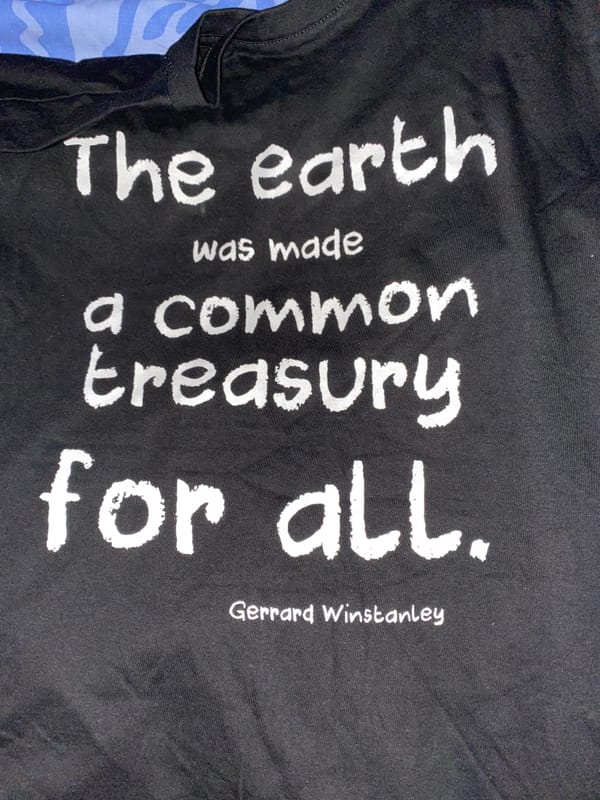Why Ecosocialism?

Simple but not easy
Environmentalism without class struggle is just gardening.
Chico Mendes
Contents
Capitalism bad
Markets, profits & other delusions
The big con
The ecocide
Accountability
Green nationalism
Socialism
Why "eco"?
The choice
What you can do right now
Capitalism bad
There are a couple of really difficult problems humanity faces that we all seem to be aware of, but don't talk about.
- We live in a world with rapidly deepening inequalities that are only getting worse. This is despite there being more than enough of everything to go around.
- The systems we live under are causing an ecological disaster at an ever increasing rate. We need careful management of resources to react to this and our governments are beholden to corporations and people who don't want this to happen.
If you think about this too long you could end up feeling despairing and give up, choosing instead to ignore what's happening and look for what comfort you can find before the curtain falls. This isn't what I believe, but in order to have a clear view of what's required you will need to understand where the problems come from and how to deal with them.
In a word, capitalism. Capitalism is a system where we have created our own nemesis. We have enormous productive power, more than capable of of meeting the needs of every human being, but instead it is turned into a way for a very small number of people to make profit because they own things. That ownership is the quintessence of privilege. Human needs and capitalism's need for profit are fundamentally incompatible. When you look at some obvious lunacy, for example we produce enough food for billions more people than exist but still people starve and bleach is poured over uneaten food, it's because there is no profit to be made feeding them. Our entire economic and political system is distorted and bent to keep the profits flowing and human needs don't figure, except where they can be used to make money for someone.
Conversely if there is a human need that doesn't make money, or enough money, it will not be met, or met very badly to force a profit, even if it is vital. This is why there is avoidable homelessness and child poverty, there isn't enough profit to be made. The individualistic ideology we've been force fed over the last 50 years or so tells us that this completely unnecessary suffering is the fault of the person suffering, not a product of a system that's working perfectly for its owners. It was different in Britain and most of the global north up until the late 1970s, governments would have been ashamed of starving children, now they seem to take a revolting pride in it. That wealth was at least built in part on the backs of the people who live in what we now call the global south, but we can discuss that another time.
Markets, profits & other delusions
The thing that's stopping the eradication of inequality and the development of better, more sustainable, technologies is the drive for profit. Nobody questions it any more but the current delusion that creating markets everywhere, even for things like education, healthcare and the natural monopolies like power and water where it makes no sense, was a very questionable idea at the time. Doing this allowed the capitalists to transform our basic needs into something they could make money from. If you look what happened with water and power, where the infrastructure has been allowed to decay while massive dividends were paid to share holders it is symptomatic of the undoing of the social contract that was built after the Second World War. Education is grossly underfunded and various clowns have managed to redirect funds to pay themselves ridiculous salaries, health is is past the point of collapse and only keeps going because the staff won’t let it fail. This is everywhere there was some kind of welfare state.
Markets don’t work when there aren't enough people. You can't have competition if there isn't a big enough pool of people's cash to fight over, or it isn't big enough to run the services people need without some kind of subsidy. So organisations providing services instead fight for subsidies that they then use to create profits, it's not very markety is it? It is welfare for the rich. Companies will lobby for cash and favours while the rest of us get ever worse services. It's so obvious that it shouldn't need to be said, but here we are.
To reprise, there isn't enough left over so profiteers can profit, so subsidies will be needed to create profits. For example this describes how Rail privatisation worked in Britain, and the current farce where water companies are collapsing while their infrastructure is breaking due to a lack of investment, but they are paying shareholders massive dividends and have been saddled with unnecessary debt that was used for historical payouts.
Yet every time some new problem manifests you get a slogan-spouting muppet dragging an even-more-rickety-than-the-last-time Aunt Sally market behind them, acting like creating yet another demonstration of a failed idea is instead a good idea, the only idea, despite mountains of evidence to the contrary. Mainstream politicians have been so mentally enfeebled by the decaying neoliberal culture they have nothing else to offer. For example, to address the extremely high energy costs in Britain, the Labour party are proposing forming some kind of umbrella organisation with a very patriotic-sounding name instead of taking back control of the power monopoly from the hedge funds and banks that have been paying themselves massive dividends while letting things break and robbing us. It looks like they may do the same for Rail, well whoop de do.
The big con
The smart way to keep people passive and obedient is to strictly limit the spectrum of acceptable opinion, but allow very lively debate within that spectrum — even encourage the more critical and dissident views. That gives people the sense that there’s free thinking going on, while all the time the presuppositions of the system are being reinforced by the limits put on the range of the debate.
Noam Chomsky
We're told there is no alternative, which is manifestly untrue. There is no alternative if you accept the decay and decline that comes from propping up a system that is well past its sell by date. There is no status quo to protect, because the status quo is failure and ecocide. If you sit on your hands you're going to watch the world burn. So instead of going with the destruction we should oppose it and work for something better.
Backing all this up we have the status quo media and our bland mainstream political class. They are owned by the billionaires who want things to continue as they are despite the harm that is being done to the vast majority of human beings and the biosphere. If a billionaire can make a few extra pounds and you will die or be harmed as a result of their actions they'll do it anyway.
The past 50 years of neoliberalism did huge damage to the worker class movement all over the world. It made it easier to increase the severity of the exploitation and remove the safety nets that gave us the confidence to push back against our owners. This has meant we have been conned into believing in scarcity and how all of the increasing difficulties we have just surviving are down to our failure as individuals. This is a con, our minds have been hypnotised into despair, what the late Mark Fisher called Capitalist Realism.
We don't have to accept this, a better world is not only possible but necessary, or the industrial complex life we're living now is doomed.
The ecocide
The concept of Ecocide came out of the work of international lawyer Peter Falk after the destruction caused by Agent Orange (another wonderful Monsanto product) in the Vietnamese war that caused enormous and continuing environmental damage and loss of life, and the Bhopal disaster in India, where a gas leak from a chemical plant killed and damaged thousands with zero consequences for the polluters. The concept exists, but the law has never been ratified.
Corporations have been committing ecocide for as long as there have been corporations. In England you could easily say that the current drive to fill the rivers with sewage is an ecocide. If ecocide was ratified as a criminal act, rather like genocide has been, then we could take corporations and states to court, but does that feel likely given the balance of forces in the world at the moment?
Our political class are in thrall to the people who are making money from the ecocide and just want us to ignore it until it's too late. For example, the UK Reform Party are really anti green initiatives, and tell their supporters that net zero is a danger to them. They received £2.3million from big oil in the last election. Like most crypto fascist groups they are completely in thrall to big money, while pretending to stand up for the disenfranchised and doing a lot of lying.
Accountability
Mainstream economists talk about externalities, for example:
In the case of pollution—the traditional example of a negative externality—a polluter makes decisions based only on the direct cost of and profit opportunity from production and does not consider the indirect costs to those harmed by the pollution. The indirect costs include decreased quality of life, say in the case of a home owner near a smokestack; higher health care costs; and forgone production opportunities, for example, when pollution harms activities such as tourism. Since the indirect costs are not borne by the producer, and therefore not passed on to the end user of the goods produced by the polluter, the social or total costs of production are larger than the private costs.
Because corporations have limited liability the full cost of the damage they cause cannot be clawed back from them. The rest of us end up paying the financial and health costs and the damage is often permanent. I recently republished a review of the book Ecocide, by Professor David Whyte. He proposes that we start holding corporations, and the people who hide behind them, to account. He proposes a corporate death penalty:
- Corporate structure must be broken, the activities of any corporation must be limited to doing one thing, abolish cross ownership of each other to limit the damage they can do.
- Impunity for investors and share holders must end. Limited liability is unsustainable. They must be held fully responsible for any activities they profit from. Asset shielding must be ended, and equity fines implemented.
- Impunity for corporate executives must end. There is an argument that doing this would affect the pool of talent for executives who might flee to other countries that are less likely to hold them responsible if things go wrong. Who cares if this puddle is a little less deep?
The chances of this happening at the moment are low. We still need to remember this when we can do something about it, and it's a good set of principles to share and campaign with.
Green nationalism
If you don’t start with a socialist viewpoint you can fall into narrow thinking defined by our owners. Things like accepting national borders and being taken in by the fear that comes from artificial scarcity can take you down a bad path. If all needs are met there is no need for conflict, instead perfect grounds for love and understanding.
For example, I was mystified why the German Greens were so anti immigration and pro Israeli warmongering, but when you realise they aren’t socialist minded it becomes very clear.
If you don’t question capitalist reality then you only have the tools that reality leaves you with, the tools our owners let us have. We already know that they don’t work and lead to abhorrent amounts of human suffering and pathetic cognitive dissonance in its victims. Plus, it won’t help the environment at all. This leads to a narrow chauvinistic despair in the face of the ecocide. If you don't realise that borders are made up dangerous nonsense that kill, then you will end up with a head full of flags and bitterness.
This also explains why some on the left used to describe the Green Party as Tories on bicycles. Back then the party's supporters weren't challenging the neoliberal story and instead were going along with it, but adding a green slant to the mainstream. In the last election the Party stood on a platform of restoring the NHS, a tax on the super rich, and building houses for the homeless. None of these policies are things that would please the British establishment. I would argue that they're now working as socialists on bicycles.
Socialism
The interests of the working class are the interests of all; the interests of the bourgeoisie are the interests of capital, which are the interests of no-one.
Mark Fisher - Exiting the Vampire Castle
Over 100 years ago when they first tried to build a socialist society in Russia they were faced with terrible problems. They had practically no industry of any kind, most of the population were peasants who were scraping a subsistence living from the soil, and the allied powers had sent armies to try and crush them. After things stabilised a little they concentrated on creating the heavy industry they needed to create weapons so they could survive. Modern thinking about sustainability and not damaging the ecosphere didn't exist then, and even if it had they were desperate to survive and it would have been a nice to have instead of something that isn't open to negotiation.
The picture we have of socialism comes from this period. A struggle to survive that was then challenged by the Nazi invasion in the second world war. They beat the threat at the cost of millions of lives. This destruction of the best of them was one of the factors that led to the eventual decay of the socialist experiment.
In fact the green history of the countries before the socialist experiment was destroyed by neoliberalism is as yet untold in the mainstream. We've also been subject to over 100 years of anti-communist propaganda and we know how our owners like to lie about things. Often they do vile things and accuse others of doing them. There are some books that talk about this, however, if you want to check them out. A short account is here.
There was talk of a Red Plenty in the early 1960s, where socialist states would finally overtake the West, but this didn't happen for a number of reasons I haven't got space for here. Red Plenty was also tainted by the anti Communist propaganda, which makes it a hard banner to pick up and rally people around.
Why “eco”?
So we put the word eco in front of socialism to demonstrate that sustainability and ecological concerns are going to be a part of the post scarcity Green Plenty we intend to create. They are going to be central to how we do things and what technologies and what social relations we create and develop to create a world that addresses needs instead of profit. A world that is treated as the precious crucible of life that it is, instead of some greedy corporate clown's externality. A world without scarcity that is built on love and acceptance instead of violence and theft.
The choice
In 1915 Rosa Luxembourg said the choice we faced as human beings was socialism or barbarism. Now we would say that the choice is between ecosocialism or barbarism. We see an uncaring, callous political class quite happy with children starving and folks in the global south having their livelihoods destroyed by rising sea levels and disrupted weather patterns. A so-called alternative to the tories has been elected and his first action was to call for the building of more prisons, when his predecessor said his first call would be to end homelessness.
The contrast couldn't be more stark, the choice is between a grey authoritarianism or human kindness, between suppressing protest and meeting people's needs, between sleep walking into the ecocide or doing something about it. It's not really a choice, is it?
What you can do right now
We live with a culture that was found not made, our owners just kept improvising to keep their power over us and we were dragged along with them. There's nothing inevitable or insurmountable about the world we live in now. We've been taken into Fisher's Vampire Castle of the mind and been sung sickly sweet lullabies while the world is starting to burn around us. The first thing any of us needs to to is recognise this and realise there are no grounds for despair as long as we work together. A better world is both possible and necessary.
The next thing is understand that the difference between a socialist viewpoint of the world and the current viewpoint of the world is very much one of not accepting things like poverty and inequality, endless wars over resources, and the murder of children, the wanton destruction of our natural heritage, and so on. Instead it’s about asking why those things are happening and how do we eliminate them? It's not hearing the cant about the poor are always with us and doing something about it. It's about not allowing the building ecocide and its enablers to be unchallenged.
I recently did a short talk on Fisher's Acid Communism, that I will post here next. There was a summer of love in 1967, when a different world seemed to be being born. Neoliberalism's great victory was undoing this hope that started to flower in the early 70s in places like Chile and replacing it with the awful and completely wrong phrase there is no alternative. Thousands were brutalised and murdered in Chile and other places to stop this, and we owe them our love and patience to pick up the hope that was torn from their hands. We've had 50 years of murderous neoliberal nonsense and it's time to stop listening to that siren song.
We need to prepare for and create a new summer of love, but instead of mere summer uncountable decades and centuries of love, undoing the damage to ourselves and our living world. No more false scarcity ripping us apart, post scarcity means no wars and no division. Conscious consensus instead of stumbling into unconscious barbarism. They are us, we are they, deliberately making a better world instead of forgetting our true human heritage and dying out. That’s the choice, and we must do it together.
This involves working with other ecosocialists, joining and helping grow campaigns, parties and trade unions, and being open to change.
You need to educate yourself, and be very careful not to fall into the nationalist trap I outlined earlier. You must turn away from the hate that's been stirred up to divide us.




